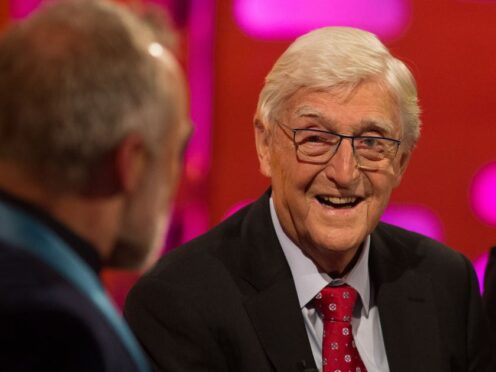Sir Michael Parkinson was the king of the chat show.
At the height of his fame in the 1970s and 1980s, millions of people tuned in every week to see him tease revelations out of the stars that shared his studio.
His conversations with guests including Muhammad Ali, John Lennon and an ill-fated confrontation with Rod Hull and puppet Emu, during which he was floored by the late comic, kept him ahead of the competition for more than a decade.
Sir Michael, who has died at the age of 88, could make stars too – a series of successful appearances on the show put Sir Billy Connolly, then a jobbing Scottish comedian and singer, on the road to worldwide fame.
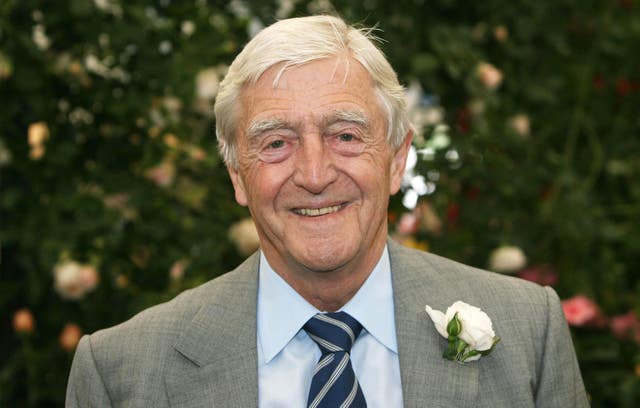
It was a long way from Sir Michael’s humble beginnings in Yorkshire, where he was born in 1935.
He grew up in a council house in Cudworth, near Grimethorpe colliery, where his father was a miner.
Sir Michael later told how his father took him down the pit to show him the grim reality of life underground so he would not be tempted to follow in his footsteps.
He later recalled: “He told me that if I ever changed my mind and he saw me coming through the pit gates he would kick my arse all the way home.”
After landing a place at Barnsley Grammar School, Sir Michael took his first steps in journalism with local papers in Yorkshire before moving to Fleet Street.
He later worked as a producer at Granada TV and eventually moved in front of the cameras, taking over the presentation of Granada’s Cinema series in 1969.
Two years later Sir Michael compered the regular afternoon show Teabreak for Thames Television, joined at one stage by his wife Mary who later presented the programme in her own right.
Parky – as he was affectionately known – then started an 11-year stint on BBC One that saw his weekly talk show become essential viewing for millions during its run until 1982.
It ran to 361 editions featuring nearly 1,000 of the world’s most famous people. From 1979 until 1982 he also presented Parkinson for ABC and Channel 10 in Australia.
Perhaps Sir Michael’s best-known interviews were the four he did with Ali, a boxer known as much for his razor-sharp wit as he was for his pugilism.

The first came in 1971 and may be the most famous chat show interview in British TV history.
Ali, who had been beaten by Joe Frazier in “the fight of the century” six months earlier, was at his brilliant and charismatic best, earning the applause of a rapt audience while discussing racism.
Sir Michael too admitted he was in awe of the boxer.
He later said: “I’d interviewed people I’d admired since childhood, like Fred Astaire and Gene Kelly and all the glorious Hollywood women I’d fallen in love with. But Ali was real and tangible and there was a sense of wonder about meeting him.”
The final interview, in 1981, now serves as a dreadful preview of the health problems that would plague Ali’s later life.
After spending years taking destructive blows to the head, the once buzzing Ali appears ponderous, slurring his words while attempting to answer questions about brain damage.
He had recently been beaten by Larry Holmes.
Recalling the interview in the wake of Ali’s death in 2016, Sir Michael said: “That interview was autumnal. He was not well, his voice was slurred and I felt so sad, because I knew I’d never see him again. We all knew what was going to happen, it was like watching a great tower being demolished in slow motion.”
However, Sir Michael’s chat show career was not all plain sailing.
In 2003 came the excruciating interview with US actress Meg Ryan.
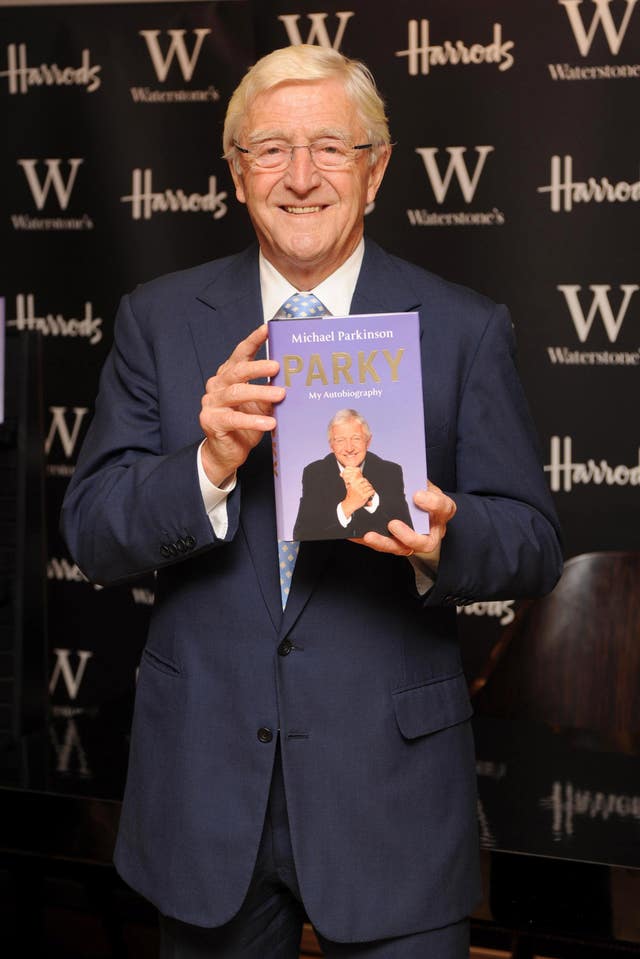
The Sleepless In Seattle star appeared to want to be elsewhere, giving Sir Michael a series of brief answers.
Sir Michael asked “if you were me, what would you do now?” Ryan replied: “Just wrap it up?”
Parkinson later called her “an unhappy woman”, while Ryan branded him a “nut” and said he had spoken to her “like a disapproving dad”.
However in 2021, Sir Michael offered an apology to Ryan for the infamous interview, telling Radio Times: “I wish I hadn’t lost my temper with Meg Ryan. I wish I’d dealt with it in a more courteous manner.
“I was quite obviously angry with her and it’s not my business to be angry towards the guests. I came across as kind of pompous and I could have done better.”
The chat show host, known for his distinctive Yorkshire accent, also had an awkward encounter during an interview with Dame Helen Mirren, which he later reflected on as “cringeworthy”.
The veteran broadcaster introduced the stage and screen star as the “sex queen” of the Royal Shakespeare Company before quoting a critic’s description of her as projecting “sluttish eroticism”.
During the interview, Sir Michael asked the then 30-year-old if her “equipment” distracted audiences and if serious actresses can have “big bosoms”.
Dame Helen later described him as a “sexist old fart”.
Despite the dawn of the #MeToo era and a changing in social standards, Sir Michael declined to apologise fully for the interview in later years.
But he told Piers Morgan’s Life Stories later in 2019: “I feel it’s of its time, and of its time it’s embarrassing. It was over the top, absolutely so.”
When Morgan suggested the comments were sexist, Sir Michael replied: “Well, maybe. But nobody got hurt, nobody died.”
He said he had since interviewed Dame Helen but they had not discussed the dispute.
Sir Michael explained: “She said what she had to say, I said what I had to say, and that’s the end of it.”
His BBC TV comeback came in 1995 with a series of late-night tributes to some of the all-time greats of the entertainment world in Parkinson: The Interviews.
The show’s format of clips from original interviews, together with footage of the stars’ performances, was a hit, leading to two further series and the eventual return of his chat show in 1998 with a string of high-profile interviews with guests such as Sir Anthony Hopkins, Sir Elton John, Sir Billy and Ewan McGregor.
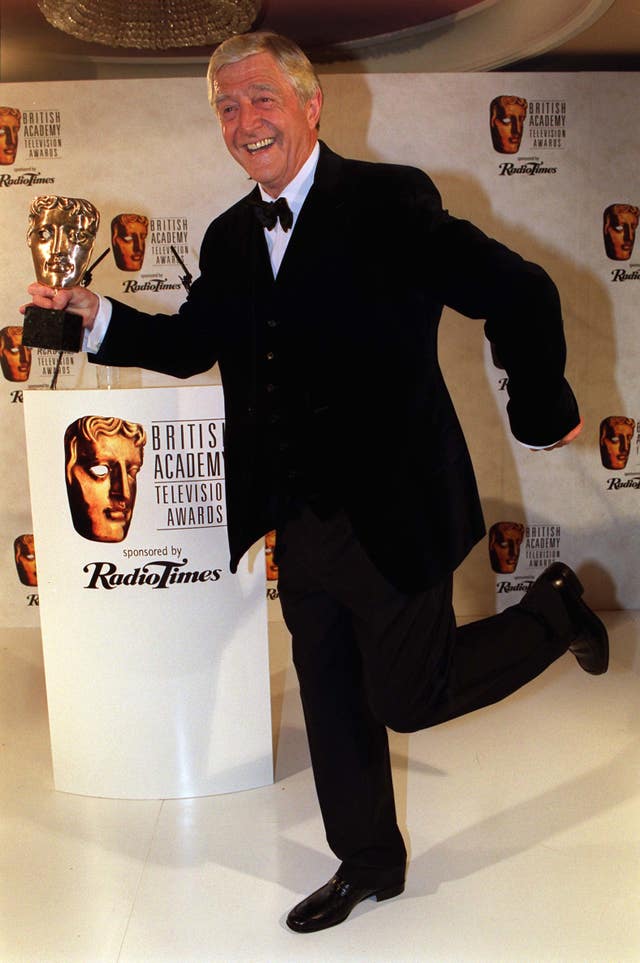
In 1999 the presenter pulled off the huge coup of having Sir Paul McCartney on his show, fulfilling a pledge the musician made more than 25 years earlier.
In 2004, Sir Michael quit the BBC and took his show to ITV where he stayed on screen for three more years.
He signed off telling viewers: “Over the years it has been a privilege to meet some of the most intelligent and interesting people.
“It has always been a great joy and I shall miss it.”
But the pull of his TV sofa was too great and he had one last comeback in him, returning in 2012 with a new series for Sky.
In 2019, Sir Michael swapped sides when he appeared as a guest on Morgan’s Life Stories.
He said he surprised himself when he broke down while recalling his father’s death.
Even during his long career as an interviewer, Sir Michael said he could only remember one guest being reduced to tears – comedian Bob Monkhouse during a discussion about his son who had cerebral palsy.
Sitting on the BBC Breakfast sofa in 2022, Sir Michael suggested it would be “interesting” to interview billionaire Elon Musk, who had recently taken over the social media platform Twitter.
During the interview, he also admitted he disliked watching his past interviews as he feels his television persona was a “disguise”.
Asked if he was sick of seeing his former TV clips, he said: “Absolutely, because I don’t recognise the person. It’s a disguise, this is a disguise. All of it.
“You’re not yourself at all, it changes you, no matter how considerate you might be of the problems of being famous, it changes you and it’s bound to.”
He also revealed that he is prouder of the work he has done as a writer than as a presenter.
Throughout his broadcasting career he continued to write, with sports columns and numerous books to his credit.
In 1990 he joined The Daily Telegraph, writing a regular weekly column on sport for the paper, as well as contributing to other publications.
His career in broadcasting led to his inclusion in the Queen’s Birthday Honours list in 2000, when he was awarded a CBE, and a knighthood in the 2007 New Year Honours.
In 2021, the BBC celebrated the 50th anniversary of the launch of Sir Michael’s chat show with a programme delving into the archives to find his most memorable interviews.
Parkinson At 50 coincided with the 86th birthday of the veteran broadcaster.
He said: “When you reach my age, birthdays are greeted with more of a sense of relief than celebration but this year will be different because 50 years ago a much younger Michael Parkinson was celebrating his 36th birthday and looking forward to starting a new show for the BBC.”
Some of Sir Michael’s other broadcasting credits include a two-year stint on BBC Radio 4’s Desert Island Discs and an award-winning show on Radio 2 called Parkinson’s Sunday Supplement.
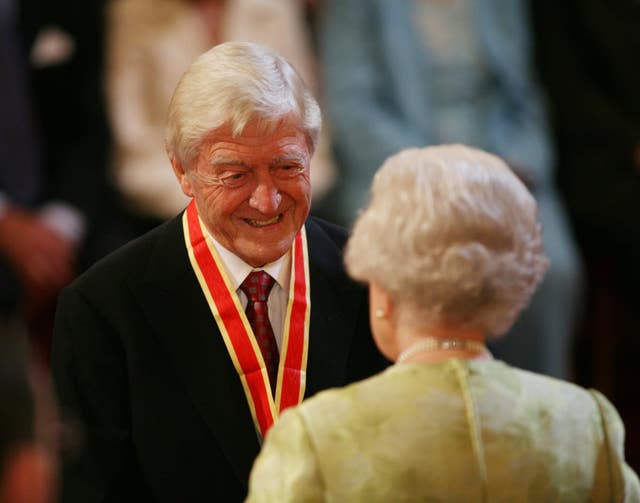
He said of a piece in his latest book My Sporting Life, co-written with his son Michael Parkinson Jr, about his late friend and English cricketer Fred Trueman, that he would like it to be used as a benchmark of his talent.
In 2013, he revealed he had prostate cancer and was undergoing radiotherapy after being diagnosed with the disease following a routine health check.
Two years later he was given the all-clear from doctors, telling the BBC that he still needed tests regularly and the “occasional blood transfusion”.
During a radio interview in November 2020, the TV star also spoke about his relationship with alcohol and said he was thinking about “people I knew who had become tragically involved with the booze”, including his friend George Best, when he decided to stop drinking.
Sir Michael added the most important factor was his wife Mary, who told him he was “ugly” when he was drinking.
Speaking to former Scottish Conservatives leader Ruth Davidson on her LBC show An Inconvenient Ruth, Sir Michael recalled: “I didn’t want to end up… I pulled out at the right time and I must say that when I pulled out, I had in mind people I knew who had become tragically involved with the booze.
“The killer, as far as I was concerned, psychiatrists can make of this what they want, but I might remember it as being the thing that stopped me, was Mary my wife.
“She said to me one day, ‘do you know what happens to you, the worst thing when you drink?’ No, says I. She said, ‘you become ugly’.
“And that did me. Ugly! Oh yes.”
He added: “It was necessary, it was needed, it was required because like all drunks, you don’t see yourself as other people do.
“You have an imaginary concept of yourself as this jolly fellow, pouring down, ‘oh look at him’, but it’s not like that at all.”
Among his favourite TV shows to watch was ITV’s long-running soap Coronation Street, which he had feared was “in danger of becoming just another formulaic soap” after revealing he “recoiled” from a murderous plotline in the show which aired in 2017.
Writing in Radio Times at the time, he said the gruesome storyline, which saw villain Pat Phelan (Connor McIntyre) kidnap, imprison and then murder Andy Carver (Oliver Farnworth) and Vinny Ashford (Ian Kelsey), felt a long way from the programme he enjoyed so much in the 1960s.
He formed a production company, Parkinson Productions, in 2007 with his son Mike.
Sir Michael is survived by his wife and three sons.
